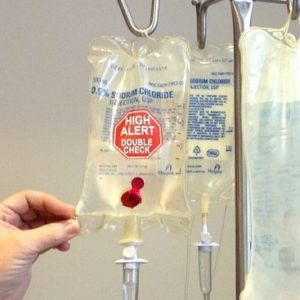Neutropenia
What is neutropenia?
Neutropenia is a blood condition caused by an insufficient or completely absent amount of neutrophil in the blood. Neutrophils are a type of white blood cell that handle a large amount of the body’s immune response. In adults, a neutrophil count of less than 1,500 per microliter of blood is considered to be low. Neutropenia may be cyclic (occurring in repeated episodes) or idiopathic.What are the symptoms of neutropenia?
Typical symptoms of neutropenia include fever, sores affecting the mouth, and infection. Other symptoms could include sore throat, gingivitis, anemia, and fatigue.What causes neutropenia?
Neutropenia can be acquired or inherited. In some cases there is no explanation for its cause. When inherited, neutropenia is passed through an autosomal dominant pattern, and appears to be a result of a mutation in the ELANE gene (a protein that is responsible for developing neutrophils). Noninherited forms of neutropenia can be caused be chemotherapy, or caused by diseases such as leukemia, hepatitis, HIS/AIDS, Lyme disease or myelofibrosis.How is neutropenia diagnosed?
Neutropenia may be suspected throught he observation of clinical symptoms. A blood test is required for a diagnose, and is usually confirmed over multiple tests within a certain time frame. Genetic testing may also be useful in confirming a diagnosis.What are the treatments for neutropenia?
Careful and quick treatment of symptoms is often important for people with neutropenia. Fevers and infections should be treated as soon as possible with antibiotics. Abdominal pain dhould be treated seriously, as it could lead to fatal complications. Granulocyte colony-stimulating factor (G-CSF), or Neupogen, may be effective in increasing neutrophil count in some patients. Another treatment may include hematopoietic stem cell transplantation (HSCT) if a well matched donor can be found.Where can I find out more about neutropenia?
Neutropenia Articles

The Long Road to FDA Approval of Plinabulin and G-CSF to Prevent Chemotherapy Induced Neutropenia
Rose Duesterwald
January 21, 2022
Read More »

Harvard Awards a Total of 5 Million Dollars to Research for 5 Diseases
Trudy Horsting
November 25, 2020
Read More »


Study: Felty’s Syndrome Presents Differently in Pediatric Patients
James Moore
April 14, 2020
Read More »


Study Suggests Female Cancer Patients Have Better Outcomes After Treatment, Experience Worse Side Effects
Scott Carlson
June 19, 2019
Read More »
-201x300.png)
In-Patient Hospitalization vs. At-Home Programs: Will Doctors Be Making House Calls Again?
Rose Duesterwald
April 30, 2019
Read More »

Combining Tests Improves Rate of Diagnosis for Neutropenia
Trudy Horsting
February 19, 2019
Read More »



